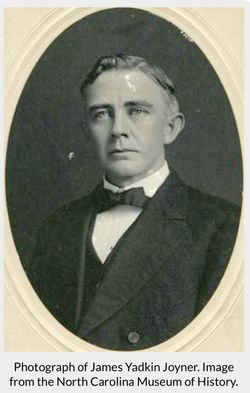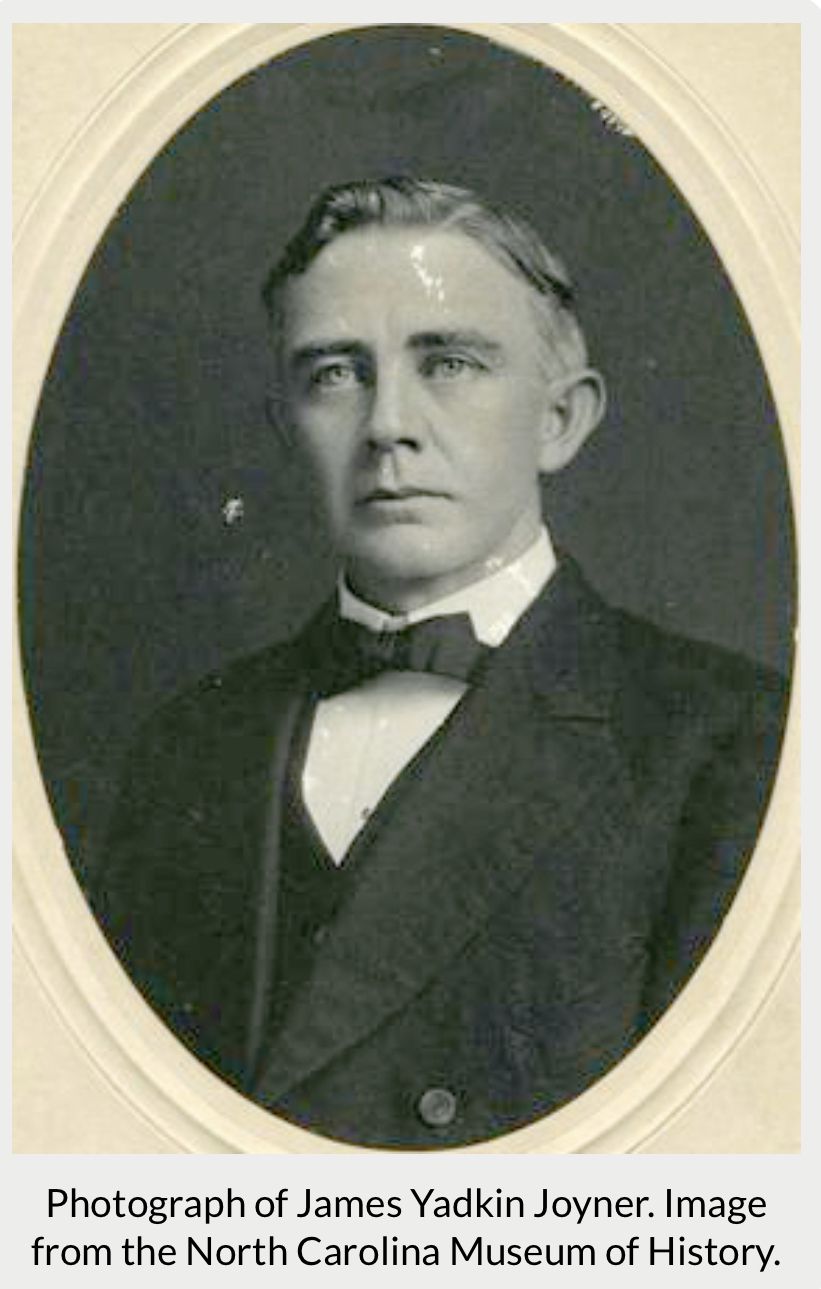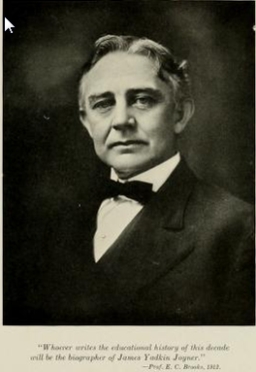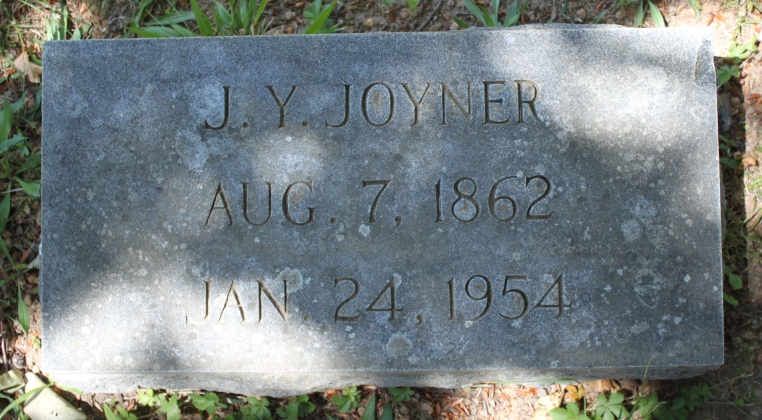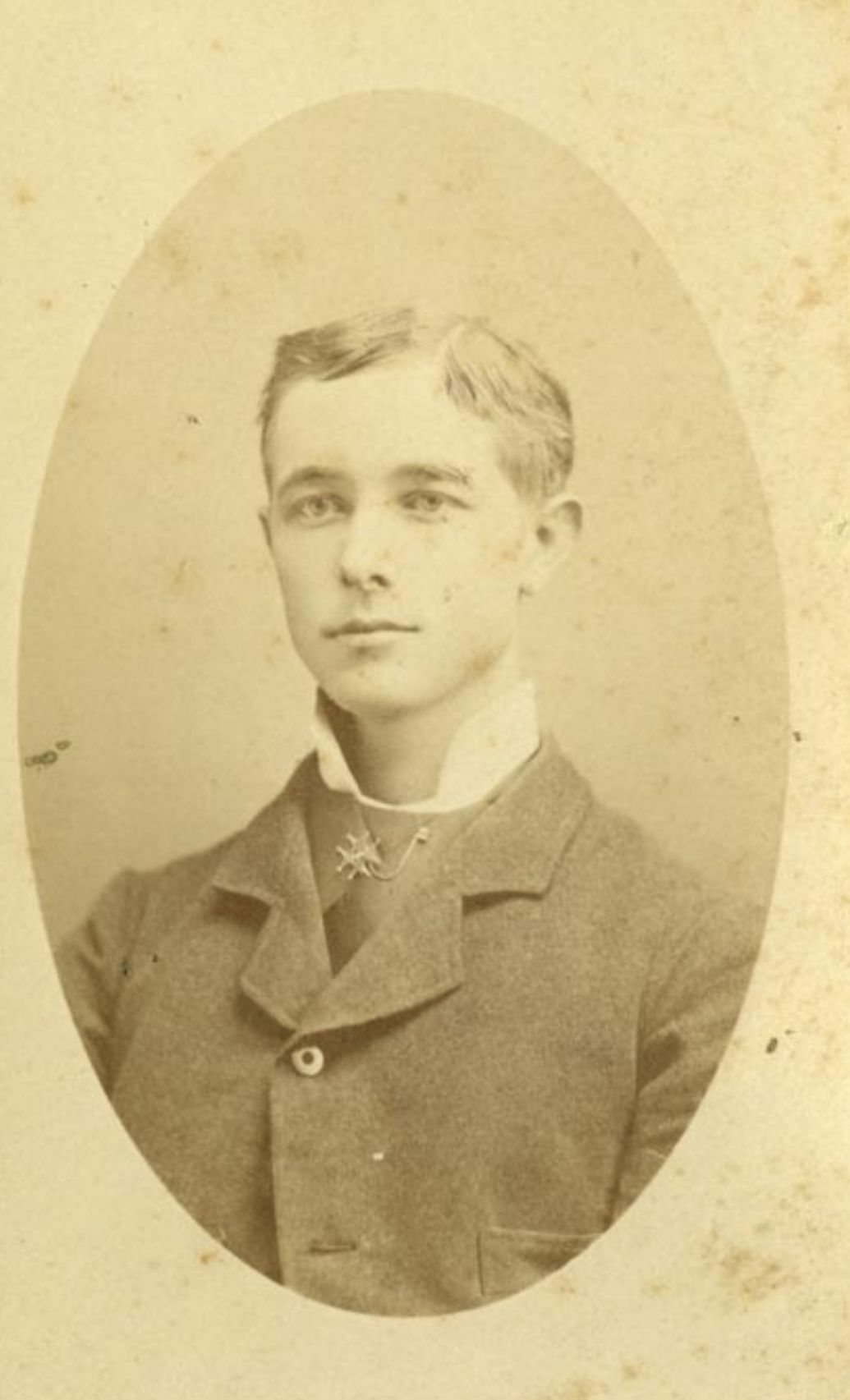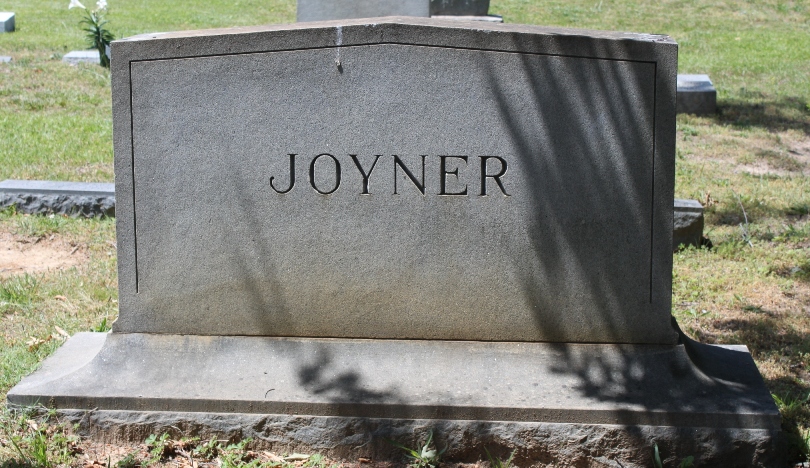His early education came from his grandfather, and from the only nearby school, LaGrange Academy. By 1878, barely sixteen years old, he completed the studies offered at the Academy and entered the University of North Carolina. He was young for college work, but he soon became a sound student and a leader in a group of friends who were destined for prominence in later years. Among his classmates were Aycock, Alderman and McIver, already mentioned, and also such outstanding men as Charles R. Thomas, later a Congressman;
Robert P. Pell, a college president; Locke Craig, Governor of North Carolina; M. C. S. Noble and Horace Williams, both prominent in the University and in education circles in general during later years; and Robert W. Winston, noted State judge and writer.' After only three years at Chapel Hill, young Joyner was graduated with a Bachelor of Philosophy degree. He was chosen as one of the commencement speakers out of the 31 graduating in 1881, and the topic of his speech was "Self-Government.
Throughout his life he was a loyal
alumnus of the University, active in alumni work and ever ready to lend a helping hand to any worthwhile project undertaken at Chapel Hill.
In August of the year he was graduated, Joyner began his teaching career at the LaGrange Academy in his home county, and the next year, 1882, he became its principal.
When Joyner began teaching here, his future wife, Miss Effie Rouse, was one of the older students and therefore was taught by her future husband. It was a small private school, similar to the hundreds of other academies that provided almost all of the secondary educational facilities available in the South at that time. It was both a boarding and a day school, and the young principal probably taught all of the subjects in the upper grades, thus providing himself with the first-hand knowledge of teaching problems and methods that was to be so useful to him in later years. He also served as superintendent of schools in Lenoir County during the years 1882 to 1884, but since the county's public school system was almost non-existent at this date.
JAMES YADKIN JOYNER, EDUCATIONAL STATESMAN
By Elmer D. Johnson
In the history of education in North Carolina, a few names stand out above all the others - the names of Alderman, Aycock, Joyner, and McIver. They were all of the same generation, in fact, they were all students together at the University of North Carolina in the early 1880's. They were a part of the New South - a South reawakened after years of war and reconstruction, and dedicated to the building of a newer, better North Carolina. They saw that one of the great needs of their State was education - not only for the few but for all - and they combined their efforts to revolutionize the State's educational system. Together, they are mainly responsible for the creation of a system of public education in North Carolina - a system whereby public taxes supported public schools available for all the children of the State.
Of this quartet of outstanding North Carolina educators, the man most directly responsible for the great improvement in the public school system was Dr. James Yadkin Joyner, State Superintendent of Public Instruction from 1902 to 1919.
Charles Brantley Aycock, as governor of the State from 1901 to 1905, was the political power behind the educational revival in North Carolina; it was he who appointed Joyner to his post, who campaigned for education from one end of the State to the other, and who stood behind the necessary school laws as they made their slow way through the legislative channels. Charles Duncan McIver and Edwin A. Alderman were the philosophers of the new educational movement - practical ones it must be admitted - and they are remembered for their promotion of education at all levels, but mostly for their activities in higher education at the University of North Carolina and the Woman's College. Dr. Joyner, on the other hand, was both philosopher and practical educator.
It was he who put the ideas of Alderman and McIver, and the laws of Aycock, into working operation at the local level throughout North Carolina's hundred counties. lated ideas and laws into school rooms and classes, and so well did he perform this task that, at the end of his first ten years as State Superintendent, it could be said, with no one denying it, that "whoever writes the educational history of this decade will be the biographer of James Yadkin Joyner."
James Yadkin Joyner was born at Yadkin College, Davidson County, North Carolina, on August 7, 1862, the youngest of a family of seven children. His father was John Joyner, originally of Pitt County, and his mother was Sarah (Sallie) Wooten Joyner, daughter of Council Wooten, of Mosely Hall, Lenoir County. The Joyner family, together with Mrs. Joyner's parents, had moved to the western part of the State early in 1862, after the landing of Federal troops on the coast had threatened their original home in Lenoir County. John Joyner was a graduate of Wake Forest College and a planter near the present town of LaGrange before the war. His health was poor and he died about a year after his son was born. His father, also named John Joyner, had been a prominent planter in Pitt County, and a member of the State Senate from 1824 to 1828. J. Y. Joyner's maternal grandfather, Council Wooten, was also a prominent planter and politician, having served in the General Assembly for six terms, and being a member of the Governor's Council in 1862. Sarah Wooten Joyner also died only a few months after her son's birth.
Following the end of the war, young Joyner returned to Lenoir County with his maternal grandfather and grew up on the Wooten plantation there. When he was ten, his grandfather died, and a maternal uncle, Shadrach Wooten, took over the rearing of the young orphan. Shadrach Wooten was married to Henrietta Harper, the aunt of Joyner's wife-to-be (Effie Rouse's mother's sister). This emphasizes the close relationships which had existed for many years.
Additonal info provided by
Source: digital.ncdcr.gov
Contributor: Zoomgirl (49129903)
His early education came from his grandfather, and from the only nearby school, LaGrange Academy. By 1878, barely sixteen years old, he completed the studies offered at the Academy and entered the University of North Carolina. He was young for college work, but he soon became a sound student and a leader in a group of friends who were destined for prominence in later years. Among his classmates were Aycock, Alderman and McIver, already mentioned, and also such outstanding men as Charles R. Thomas, later a Congressman;
Robert P. Pell, a college president; Locke Craig, Governor of North Carolina; M. C. S. Noble and Horace Williams, both prominent in the University and in education circles in general during later years; and Robert W. Winston, noted State judge and writer.' After only three years at Chapel Hill, young Joyner was graduated with a Bachelor of Philosophy degree. He was chosen as one of the commencement speakers out of the 31 graduating in 1881, and the topic of his speech was "Self-Government.
Throughout his life he was a loyal
alumnus of the University, active in alumni work and ever ready to lend a helping hand to any worthwhile project undertaken at Chapel Hill.
In August of the year he was graduated, Joyner began his teaching career at the LaGrange Academy in his home county, and the next year, 1882, he became its principal.
When Joyner began teaching here, his future wife, Miss Effie Rouse, was one of the older students and therefore was taught by her future husband. It was a small private school, similar to the hundreds of other academies that provided almost all of the secondary educational facilities available in the South at that time. It was both a boarding and a day school, and the young principal probably taught all of the subjects in the upper grades, thus providing himself with the first-hand knowledge of teaching problems and methods that was to be so useful to him in later years. He also served as superintendent of schools in Lenoir County during the years 1882 to 1884, but since the county's public school system was almost non-existent at this date.
JAMES YADKIN JOYNER, EDUCATIONAL STATESMAN
By Elmer D. Johnson
In the history of education in North Carolina, a few names stand out above all the others - the names of Alderman, Aycock, Joyner, and McIver. They were all of the same generation, in fact, they were all students together at the University of North Carolina in the early 1880's. They were a part of the New South - a South reawakened after years of war and reconstruction, and dedicated to the building of a newer, better North Carolina. They saw that one of the great needs of their State was education - not only for the few but for all - and they combined their efforts to revolutionize the State's educational system. Together, they are mainly responsible for the creation of a system of public education in North Carolina - a system whereby public taxes supported public schools available for all the children of the State.
Of this quartet of outstanding North Carolina educators, the man most directly responsible for the great improvement in the public school system was Dr. James Yadkin Joyner, State Superintendent of Public Instruction from 1902 to 1919.
Charles Brantley Aycock, as governor of the State from 1901 to 1905, was the political power behind the educational revival in North Carolina; it was he who appointed Joyner to his post, who campaigned for education from one end of the State to the other, and who stood behind the necessary school laws as they made their slow way through the legislative channels. Charles Duncan McIver and Edwin A. Alderman were the philosophers of the new educational movement - practical ones it must be admitted - and they are remembered for their promotion of education at all levels, but mostly for their activities in higher education at the University of North Carolina and the Woman's College. Dr. Joyner, on the other hand, was both philosopher and practical educator.
It was he who put the ideas of Alderman and McIver, and the laws of Aycock, into working operation at the local level throughout North Carolina's hundred counties. lated ideas and laws into school rooms and classes, and so well did he perform this task that, at the end of his first ten years as State Superintendent, it could be said, with no one denying it, that "whoever writes the educational history of this decade will be the biographer of James Yadkin Joyner."
James Yadkin Joyner was born at Yadkin College, Davidson County, North Carolina, on August 7, 1862, the youngest of a family of seven children. His father was John Joyner, originally of Pitt County, and his mother was Sarah (Sallie) Wooten Joyner, daughter of Council Wooten, of Mosely Hall, Lenoir County. The Joyner family, together with Mrs. Joyner's parents, had moved to the western part of the State early in 1862, after the landing of Federal troops on the coast had threatened their original home in Lenoir County. John Joyner was a graduate of Wake Forest College and a planter near the present town of LaGrange before the war. His health was poor and he died about a year after his son was born. His father, also named John Joyner, had been a prominent planter in Pitt County, and a member of the State Senate from 1824 to 1828. J. Y. Joyner's maternal grandfather, Council Wooten, was also a prominent planter and politician, having served in the General Assembly for six terms, and being a member of the Governor's Council in 1862. Sarah Wooten Joyner also died only a few months after her son's birth.
Following the end of the war, young Joyner returned to Lenoir County with his maternal grandfather and grew up on the Wooten plantation there. When he was ten, his grandfather died, and a maternal uncle, Shadrach Wooten, took over the rearing of the young orphan. Shadrach Wooten was married to Henrietta Harper, the aunt of Joyner's wife-to-be (Effie Rouse's mother's sister). This emphasizes the close relationships which had existed for many years.
Additonal info provided by
Source: digital.ncdcr.gov
Contributor: Zoomgirl (49129903)
Family Members
Sponsored by Ancestry
Advertisement
Advertisement
